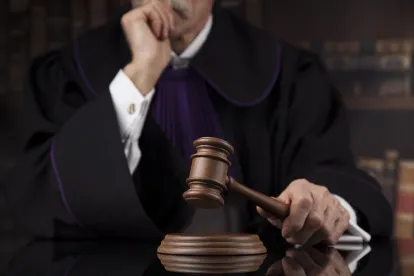Recent Precedential Decisions Applying Fintiv
When a company is sued for patent infringement, often one early strategic consideration is whether to counterattack the patent’s validity at the Patent Trial and Appeal Board (PTAB) in a parallel post-grant proceeding such as inter partes review (IPR) or post-grant review (PGR). Although the PTAB has recently conformed certain practices more closely to litigation — notably, its claim construction and indefiniteness standards — it remains a valuable venue for patent challengers seeking a relatively speedy, predictable, and cost-effective process.
The PTAB may decline to permit these simultaneous challenges, however, by exercising its discretion under 35 U.S.C. §§ 314 and 324 not to institute review. A formal rule governing institution in these circumstances may be forthcoming. At present, however, the PTAB’s decision is guided by consideration of six factors in the recently-articulated (and controversial) “Fintiv” test.
In deciding whether to invest in the effort and expense of pursuing a post-grant challenge, accused infringers will benefit from understanding how the PTAB has applied the Fintiv factors. To this end, in December 2020, the PTAB designated its first precedential decisions concerning this test: Snap, Inc. v. SRK Tech. Inc. and Sotera Wireless, Inc. v. Masimo Corp.
Key aspects of these decisions’ rationale are summarized below. In both, the PTAB took a “holistic” view of the Fintiv factors and both IPRs were ultimately instituted. Notably, the decisions indicate that a patent challenger’s chances of avoiding discretionary denial under Fintiv may be enhanced by seeking review before significant discovery occurs or a patent’s claim terms are construed in the district court action, and if the invalidity positions materially differ between the forums.
-
Whether the court granted a stay or evidence exists that one may be granted if [a post-grant] proceeding is instituted
Strongly against denying institution: The stay of the Snap litigation and its unscheduled trial date allayed concerns about inefficiency and duplication of efforts.
Neutral: A motion to stay the Sotera litigation had not yet been decided.
-
Proximity of the court’s trial date to the Board’s projected statutory deadline for a final written decision
Against denying institution: In Snap, the possibility that the PTAB’s final written decision would issue at or before trial (if institution were denied and the then-stayed litigation resumed) was “unfounded speculation.”
Neutral: The Sotera case’s scheduled trial date fell “around the same time” that the PTAB would issue a final written decision.
-
Investment in the parallel proceeding by the court and the parties
Against denying institution: The Snap litigation was in its “early stages.” Although preliminary contentions had been exchanged and the parties were preparing for claim construction briefing, no “substantive orders” regarding the patent had issued (e.g., a Markman order) and no “significant discovery” had been completed (e.g., no depositions taken).
Additionally, although Snap waited approximately a year to file its petition, its timing did not favor denying institution because the case was in an “early stage” prior to being stayed.
Against denying institution: Sotera’s initial infringement and invalidity contentions had been exchanged, but the Markman briefing deadlines had been vacated and “much other work” remained to develop the invalidity case—e.g., fact discovery was ongoing, expert reports were not yet due, and substantive motion practice was yet to come.
Sotera’s delay in filing its petition (two weeks before the statutory deadline) was also deemed reasonable, given the large number of patents and claims challenged in eight co-pending related IPRs, and the difficulty in preparing petitions due to pandemic-related office closures.
-
Overlap between issues raised in the petition and in the parallel proceeding
Against denying institution: The prior art and arguments in Snap’s petition were “materially different” from those in litigation because the petition contained multiple references that were not included in its invalidity contentions. The PTAB also observed that, due to the stay of litigation, it would likely address patentability issues before the trial, potentially simplifying the issues for trial while obviating inefficiency and conflicting decisions.
Strongly against denying institution: Sotera advanced similar invalidity arguments in both actions, but it filed a stipulation that, if IPR were instituted, it would not pursue “any” ground raised or that reasonably could be raised in the IPR, expressly leaving open the possibility of litigating challenges under 35 U.S.C. §§ 101 and 112. This “broad” stipulation ensured that IPR was a “true alternative” to litigation by mitigating concerns of duplicative efforts and conflicting decisions.
-
Whether the petitioner and the defendant in the parallel proceeding are the same party
Favoring denial of institution: The Sotera parties were the same in both proceedings.
Neutral or “slightly” favoring denial of institution: The Snap parties were likewise the same. In evaluating this factor, however, the PTAB noted the litigation stay and lack of substantial overlap between Snap’s petition and invalidity contentions.
-
Other circumstances that impact the Board’s exercise of discretion, including the merits
Against denying institution: The Snap panel was unpersuaded by SRK’s arguments that it would be in the interest of justice to pursue discovery relating to secondary considerations in litigation rather than at the PTAB, as SRK would have the opportunity to seek “the same types of discovery” in IPR. It also remarked on the apparent strength of Snap’s challenges.
Neutral: Sotera met its burden of demonstrating a reasonable likelihood that it would prevail with respect to at least one claim.



 />i
/>i
